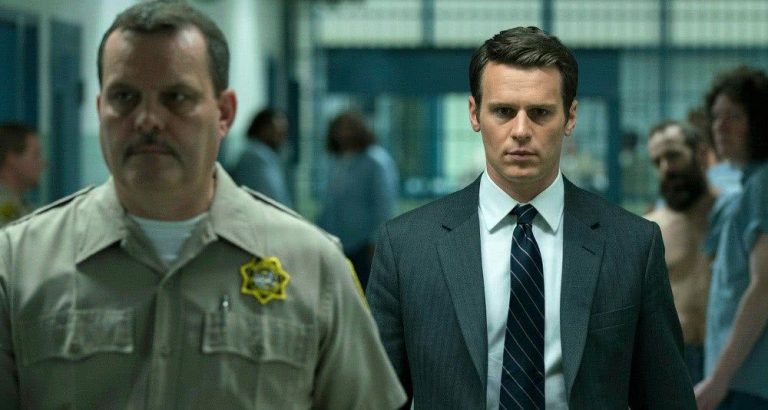There are rules to detective shows, as iron cast as Biblical commandments: Cops Must Always Be Mismatched; Serial Killers Must Always Be Charming And Ingenious; Women Must Always Have A Stony Exterior That Masks A Tender Heart Of Gold. And at least on first glance, Mindhunter, the new Netflix Original series from executive producers David Fincher and Charlize Theron, hangs onto the conventions of the genre as though its life depends upon it.
Mindhunter has all the cliches, from a rogue’s gallery of conniving, hyper-intelligent shark-like killers, many of them based on real life murderers, to a socially maladjusted, brilliant lead, Holden Ford (Jonathan Groff). And as for the show’s central relationship? Well, no points if you’ve already guessed – it’s based on an unfurling and unexpected friendship between two detectives who don’t initially get on! And get this: they actually disagree on the fundamental merits and values of policing!
“Rational” is the word of the day when it comes to Mindhunter
So yeah, Mindhunter is a link in a very long chain, one that reaches all the way back to the procedurals of Edgar Allen Poe, and incorporates everything from the hard-boiled fiction of your regular Raymond Chandler type to the ultra-realism of The Wire. The second episode of Mindhunter even involves a direct reference to David Simon’s televisual masterpiece, as Holden and his partner Bill Tench (Holt McCallany)find themselves banished to a dusty basement, for all intents and purposes the same no-man’s land that McNulty and his crew (sorta) entrapped the Bell crime clan from.
Maybe if Mindhunter was airing on free-to-air television that might be the point that you switch off – the moment you finally decide that you have been here and done this so many times before. And in that way, Mindhunter is a show peculiarly suited for a binge watch: as dotted with references and homages and genre conventions as it is, by its third or so episode, Mindhunter falls into a groove entirely of its own, and becomes, surprisingly, one of the most original television shows of the year.
https://www.youtube.com/watch?v=7gZCfRD_zWE
What Mindhunter has to set it apart from its contemporaries is a focus on the scientific facts of the matter. Sure, its antagonists – the coolly involving Ed Kemper (Cameron Britton), the black-eyed Jerry Brudos (Happy Anderson) – might be Lecter-types, skin-crawling arch villains capable of discussing the mutilation of women and what kind of pizza they like in the same breath. But they are not master criminals or cartoon characters; their sociopathy is explained; their unconventional desires carefully picked apart and rationalised.
In fact, “rational” is the word of the day when it comes to Mindhunter. Just as Holden tries to make sense of murderous impulses by poking at them with cutting edge behavioural science and psychological techniques, so too is the show full of the eerie, surgical remove common of Hitchcock and Clouzot. Given this is a Fincher joint, that makes sense: the man has spent his career honing his skills when it comes to keeping his distance.
Not that Fincher is the necessarily the star of the show – that mantle goes to Groff and McCallany. Somehow, against all odds, they manage to make pages and pages of jargon-heaving dialogue fascinating, aiding the show in its unconventional approach to tension.
After all, Mindhunter is light on car chases and apartment corridor showdowns and heavy on lengthy monologues about the role that behavioural science can play as a foundation for good policing, and that it works at all is a testament to the skill of its two leads. They are the keys to the show’s originality; to the strange, juddering heartbeat that turns what otherwise might have been one more procedural into something genuinely special.
Mindhunter is available now via Netflix.


































